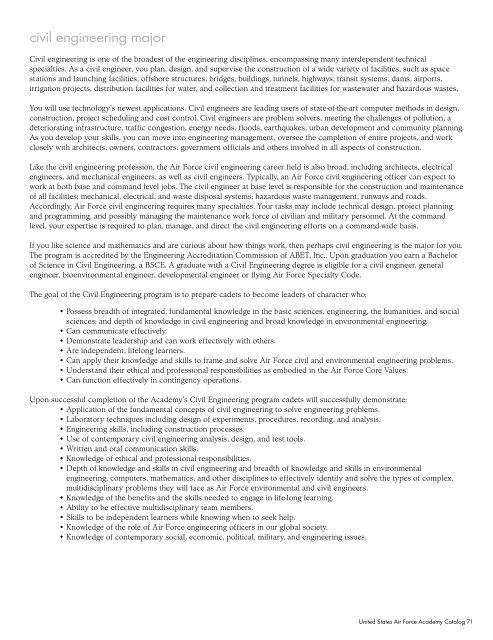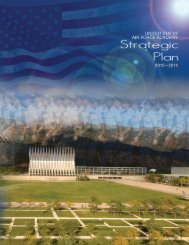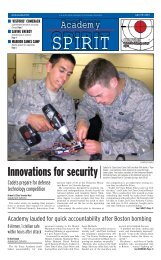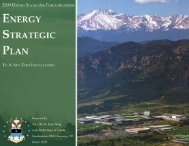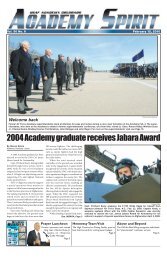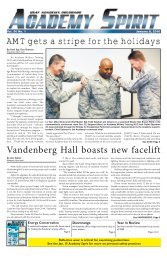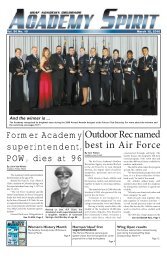2008-2009 Catalog - United States Air Force Academy
2008-2009 Catalog - United States Air Force Academy
2008-2009 Catalog - United States Air Force Academy
You also want an ePaper? Increase the reach of your titles
YUMPU automatically turns print PDFs into web optimized ePapers that Google loves.
civil engineering major<br />
Civil engineering is one of the broadest of the engineering disciplines, encompassing many interdependent technical<br />
specialties. As a civil engineer, you plan, design, and supervise the construction of a wide variety of facilities, such as space<br />
stations and launching facilities, offshore structures, bridges, buildings, tunnels, highways, transit systems, dams, airports,<br />
irrigation projects, distribution facilities for water, and collection and treatment facilities for wastewater and hazardous wastes.<br />
You will use technology’s newest applications. Civil engineers are leading users of state-of-the-art computer methods in design,<br />
construction, project scheduling and cost control. Civil engineers are problem solvers, meeting the challenges of pollution, a<br />
deteriorating infrastructure, traffic congestion, energy needs, floods, earthquakes, urban development and community planning.<br />
As you develop your skills, you can move into engineering management, oversee the completion of entire projects, and work<br />
closely with architects, owners, contractors, government officials and others involved in all aspects of construction.<br />
Like the civil engineering profession, the <strong>Air</strong> <strong>Force</strong> civil engineering career field is also broad, including architects, electrical<br />
engineers, and mechanical engineers, as well as civil engineers. Typically, an <strong>Air</strong> <strong>Force</strong> civil engineering officer can expect to<br />
work at both base and command level jobs. The civil engineer at base level is responsible for the construction and maintenance<br />
of all facilities; mechanical, electrical, and waste disposal systems; hazardous waste management, runways and roads.<br />
Accordingly, <strong>Air</strong> <strong>Force</strong> civil engineering requires many specialties. Your tasks may include technical design, project planning<br />
and programming, and possibly managing the maintenance work force of civilian and military personnel. At the command<br />
level, your expertise is required to plan, manage, and direct the civil engineering efforts on a command-wide basis.<br />
If you like science and mathematics and are curious about how things work, then perhaps civil engineering is the major for you.<br />
The program is accredited by the Engineering Accreditation Commission of ABET, Inc.. Upon graduation you earn a Bachelor<br />
of Science in Civil Engineering, a BSCE. A graduate with a Civil Engineering degree is eligible for a civil engineer, general<br />
engineer, bioenvironmental engineer, developmental engineer or flying <strong>Air</strong> <strong>Force</strong> Specialty Code.<br />
The goal of the Civil Engineering program is to prepare cadets to become leaders of character who:<br />
• Possess breadth of integrated, fundamental knowledge in the basic sciences, engineering, the humanities, and social<br />
sciences; and depth of knowledge in civil engineering and broad knowledge in environmental engineering.<br />
• Can communicate effectively.<br />
• Demonstrate leadership and can work effectively with others.<br />
• Are independent, lifelong learners.<br />
• Can apply their knowledge and skills to frame and solve <strong>Air</strong> <strong>Force</strong> civil and environmental engineering problems.<br />
• Understand their ethical and professional responsibilities as embodied in the <strong>Air</strong> <strong>Force</strong> Core Values.<br />
• Can function effectively in contingency operations.<br />
Upon successful completion of the <strong>Academy</strong>’s Civil Engineering program cadets will successfully demonstrate:<br />
• Application of the fundamental concepts of civil engineering to solve engineering problems.<br />
• Laboratory techniques including design of experiments, procedures, recording, and analysis.<br />
• Engineering skills, including construction processes.<br />
• Use of contemporary civil engineering analysis, design, and test tools.<br />
• Written and oral communication skills.<br />
• Knowledge of ethical and professional responsibilities.<br />
• Depth of knowledge and skills in civil engineering and breadth of knowledge and skills in environmental<br />
engineering, computers, mathematics, and other disciplines to effectively identify and solve the types of complex,<br />
multidisciplinary problems they will face as <strong>Air</strong> <strong>Force</strong> environmental and civil engineers.<br />
• Knowledge of the benefits and the skills needed to engage in life-long learning.<br />
• Ability to be effective multidisciplinary team members.<br />
• Skills to be independent learners while knowing when to seek help.<br />
• Knowledge of the role of <strong>Air</strong> <strong>Force</strong> engineering officers in our global society.<br />
• Knowledge of contemporary social, economic, political, military, and engineering issues.<br />
<strong>United</strong> <strong>States</strong> <strong>Air</strong> <strong>Force</strong> <strong>Academy</strong> <strong>Catalog</strong> 71


